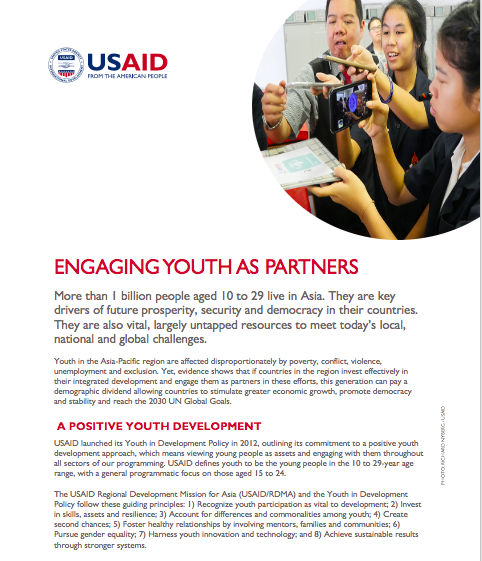Speeches Shim
Engaging Youth as Partners ![]() (pdf - 414k)
(pdf - 414k)
More than 1 billion people aged 10 to 29 live in Asia. They are key drivers of future prosperity, security and democracy in their countries. They are also vital, largely untapped resources to meet today’s local, national and global challenges.
Youth in the Asia-Pacific region are affected disproportionately by poverty, conflict, violence, unemployment and exclusion. Yet, evidence shows that if countries in the region invest effectively in their integrated development and engage them as partners in these efforts, this generation can pay a demographic dividend allowing countries to stimulate greater economic growth, promote democracy and stability and reach the 2030 UN Global Goals.
A POSITIVE YOUTH DEVELOPMENT
USAID launched its Youth in Development Policy in 2012, outlining its commitment to a positive youth development approach, which means viewing young people as assets and engaging with them throughout all sectors of our programming. USAID defines youth to be the young people in the 10 to 29-year age range, with a general programmatic focus on those aged 15 to 24.
The USAID Regional Development Mission for Asia (USAID/RDMA) and the Youth in Development Policy follow these guiding principles: 1) Recognize youth participation as vital to development; 2) Invest in skills, assets and resilience; 3) Account for differences and commonalities among youth; 4) Create second chances; 5) Foster healthy relationships by involving mentors, families and communities; 6) Pursue gender equality; 7) Harness youth innovation and technology; and 8) Achieve sustainable results through stronger systems.
Recognizing that the transition from children into adulthood is a critical time to help youth reach their full potential and expanding ability to contribute to their families and communities, USAID/RDMA engages youth in the following themes in the Asia region:
Higher Education and Youth Workforce Development
- The USAID-Lower Mekong Initiative Connecting the Mekong through Education and Training (USAID-LMI COMET) activity prepares youth for employment by bridging the gap between educational institutions and employers in the Lower Mekong region. Through the MekongSkills2Work (MS2W) approach, which improves linkages with industry and strengthens soft skills by making learning more dynamic, interactive and student-centered, educational institutions better prepare graduates for 21st century workplaces. The MS2W e-learning portal provides professional development resources for instructors, career-building tools for youth and links to the private sector. Partners such as Intel, Cisco and Amazon Web Services have donated technology and provided access to online courses, and have supported innovation challenges where youth can create technology-based solutions to global issues. By 2019, the project will reach 80,000 youth.
Reducing Discrimination and Stigmatization Against LGBTI People
- The Being LGBTI in Asia program promotes diversity and inclusion of LGBTI youth by convening civil society organizations, human rights institutions, government counterparts, academia and activists across Asia to raise awareness, enter into a dialogue and recommend actions to better empower LGBTI youth and integrate them into the society. The activity also coordinates with UNDP’s Youth Co:Lab initiative to integrate LGBTI youth-related issues into events and encourage more participation of LGBTI youth in advocating for diversity and inclusion in the youth social entrepreneurship ecosystem. For example, the program worked with the ASEAN Sexual Orientation, Gender Identity, Gender Expression Caucus, a network of Southeast Asian human rights activitists works for the inclusion of Sexual Orientation, Gender Identity, Gender Expression and Sex Characteristics and universities to convene a workshop to equip school counselors, social workers, and others in the helping profession with tools to support LGBTI youth and their families in acknowledging, understanding and empowering themselves and each other.
Health Workforce Development
- The One Health Workforce project builds the next generation of skillful and competent human health and animal health young professionals to prevent, detect and respond to infectious disease threats. Implemented since 2011 by the Southeast Asia One Health University Network (SEAOHUN) and its four country networks, the One Health Workforce includes 67 universities in Indonesia, Malaysia, Thailand and Vietnam. The networks foster cross-sectoral competencies by helping students become active learners by including students from multiple disciplines to learn and work together through One Health student clubs and programs such as health diplomacy, young leaders, field practicum and community outreach. Investing in young health professionals is critical to ensure effective and sustainable health security systems.


Comment
Make a general inquiry or suggest an improvement.